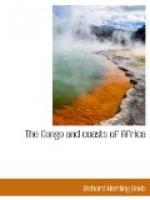They were even more crowded together than were we, but not so much with luggage as with humanity. But as a protest against the high charges of the railroad the missionaries always travel in the open car. These three young men were for the first time out of England, and in any fashion were glad to start on their long journey up the Congo to Bolobo. To them whatever happened was a joke. It was a joke even when the colored “wife” of one of the French officers used the broad shoulders of one of them as a pillow and slept sweetly. She was a large, good-natured, good-looking mulatto, and at the frequent stations the French officer ran back to her with “white man’s chop,” a tin of sausages, a pineapple, a bottle of beer. She drank the beer from the bottle, and with religious tolerance offered it to the Baptists. They assured her without the least regret that they were teetotalers. To the other blacks in the open car the sight of a white man waiting on one of their own people was a thrilling spectacle. They regarded the woman who could command such services with respect. It would be interesting to know what they thought of the white man. At each station the open car disgorged its occupants to fill with water the beer bottle each carried, and to buy from the natives kwango, the black man’s bread, a flaky, sticky flour that tastes like boiled chestnuts; and pineapples at a franc for ten. And such pineapples! Not hard and rubber-like, as we know them at home, but delicious, juicy, melting in the mouth like hothouse grapes, and, also, after each mouthful, making a complete bath necessary. One of the French officers had a lump of ice which he broke into pieces and divided with the others. They saluted magnificently many times, and as each drowned the morsel in his tin cup of beer, one of them cried with perfect simplicity: “C’est Paris!” This reminded me that the ship’s steward had placed much ice in my chop basket, and I carried some of it to another car in which were five of the White Sisters. For nineteen days I had been with them on the steamer, but they had spoken to no one, and I was doubtful how they would accept my offering. But the Mother Superior gave permission, and they took the ice through the car window, their white hoods bristling with the excitement of the adventure. They were on their way to a post still two months’ journey up the river, nearly to Lake Tanganyika, and for three years or, possibly, until they died, that was the last ice they would see.
At Bongolo station the division superintendent came in the car and everybody offered him refreshment, and in return he told us, in the hope of interesting us, of a washout, and then casually mentioned that an hour before an elephant had blocked the track. It seemed so much too good to be true that I may have expressed some doubt, for he said: “Why, of course and certainly. Already this morning one was at Sariski Station and another at Sipeto.” And instead of looking out of the window I had been reading an American magazine, filched from the smoking-room, which was one year old!




